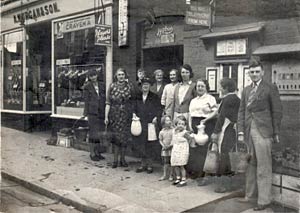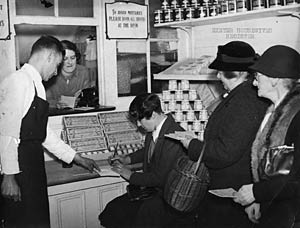
Exeter Stories
Exeter folk and friends in their own words - 1890's to the 1990's │ << Previous story │ Next story >> │
Margaret Ball - Wartime ration in Exeter
Rationing began in 1940. Because Britain is an island much of our food has to be imported. Supplies soon became short. The Germans took full advantage of this and began to sink the ships bringing supplies and the convoys which accompanied them.
To us nowadays the rations allowed were miniscule. For instance people were allowed two ounces of butter per week. In our household this caused trouble. Everyone said they were not getting their share, so each week we put our two ounces in a small dish. Then accusations flew around that it was being stolen, so it did not work. The margarine ration was better, four ounces per week It was supposed to help with cooking, but most people used it to spread on their bread to augment the butter. As far as I was concerned the real sacrifice was tea, two ounces per week, about three cups a day, or four if you had a big family and a large teapot. My father was driven to reheat the cold tea. It tasted horrible.
Milk was rationed. It was easy for a large family but people living alone found it hard. Bread was not rationed so there was no Marie Antoinette to tell the people to eat cake.
Pigs and Chickens
The egg ration was not reliable. People began to keep their own hens. This meant giving up their egg ration in exchange for a permit for chicken food.
Some enterprising families kept a pig at the bottom of their garden and fed it with scraps. They were not allowed to kill it without permission, and half had to be given to the Ministry of Food.
There was a substitute dried egg supplied by the government in silver tins. This would make a reasonable omelette when mixed with water, though it was rather tough. We children, always hungry, liked it in a sandwich.
The sugar ration was half a pound per week. After it was used up you drank your tea without sugar. Bacon worked out at one rasher each per week. Meat was rationed, but not by weight. We were allowed one shilling and twopence worth per week. (6p) It would buy one chop, but if the family put all the coupons together they could get a joint of meat, and have it hot one day and cold the next. Occasionally a rabbit was available for which there was a long queue. There were queues for everything. If you saw a queue you joined it without knowing what it was for. Sausages were not rationed but they were made from bread and scraps. British restaurants were set up by the Government where you could get sausage and mash. Liver was not rationed but the butcher kept it under the counter for his favourite customers.
Dig for Victory
Flower gardens were dug up and planted with vegetables which could be made into a tasty stew with a few bits of scrag end of mutton. Part of Northernhay Gardens was dug up and planted with cabbages and potatoes. It was tended by the park attendant, Len Williams, who was my cousin's husband. They lived in the little lodge there for 30 years. Although soap and soap powder were not rationed, it was very hard to find. We kept all our old pieces of soap and boiled them with the baby's nappies. They were made of terry towelling, no Pampers in those days. Baby items were impossible to find, things like dummies and rubber teething rings. My baby son cried all night. Desperate for a dummy I advertised in the evening paper, "Urgently wanted, any price, baby's dummy." I got several replies and two dummies. One kind man sent me one made of wood and said it might do if a could not get an other. It was a relief to get a good night's sleep.
Although sugar was strictly rationed there was a generous allowance for sweets, a quarter pound a week. With five in our family we could have had plenty, but we could not afford it. We gave a lot of our coupons away. Children under two were given orange juice and blackcurrant juice and free cod liver oil. Fruit was scarce. When my father was dying he craved oranges. There were none to be had, but my mother went all over the city and eventually found a grocer who let her have a small tin of mandarins. My father enjoyed them. A few weeks later he was dead. It was 1941. He was 55.
Anyone have any steelwool?
I used to go all over the place looking for steelwool. My mother would not believe there was none available, and said I had not really tried. Clothing was strictly rationed. Twenty six coupons had to last six months. You had to give up twelve for a coat, seven for a dress and seven for shoes. As the war progressed shoes were being made with wooden soles which clattered along like sabots. Poor people sold their coupons for half a crown (12½ pence) each. They could not afford new clothes anyway. Everyone mended and patched their clothes. It was forbidden to cut coupons out of the ration books. Some shops refused to take loose coupons, but you could send away for a dress or coat and enclose them. You seldom saw a hat in wartime. Women all wore headscarves. Old parachutes were used to make underwear. They were cream coloured. They had the appearance of shantung silk. One day I heard that there were going to be sheets on sale at Colson's shop. Although bedding was not rationed it was very scarce. My friend and rose early and were near the front the queue. We were lucky enough to get one green sheet, (we could not afford one each so we settled for one double sheet.) This we cut in half and made ourselves nightdresses. Mine lasted for years. It was very good quality cotton.
We were instructed to have no more than five inches of water in our bath, to save coal and power.
There was no semi skimmed milk. Children needed full cream milk. It was forbidden to make clotted cream, many a farmer made it for his family. Rationing did not affect farmers as much as other people. There was a Black Market if you could afford the prices. The wealthy could eat out. It was a sore point that those with money were not really rationed, but there was a rumour that some of the steaks served in restaurants was horsemeat.
There was no doubt my mind that people were much healthier in those days. There was much less obesity. The combination of rationing and exercise was good for them. People walked everywhere. Petrol was unobtainable. Many people put their cars up for the duration of the war. In any case, few people owned cars in those days, and among those allowed petrol were the forces, doctors, and commercial travellers. Cycling became very popular. By the time the war ended the British were a very fit nation.
© 2006 Margaret Ball - David Cornforth
Margaret Ball was born in Exeter in 1922. She lived in Shakespeare Avenue when the Germans bombed Exeter on 4th May 1942. Here she recalls food rationing and how civilians made do.
 A queue for
rations in Howell Road. Photo Robert Morgan.
A queue for
rations in Howell Road. Photo Robert Morgan. Issueing
meat coupons in 1939 at Lethbridge's, Cowick Street. Photo Tony
Lethbridge.
Issueing
meat coupons in 1939 at Lethbridge's, Cowick Street. Photo Tony
Lethbridge.
│ Top of Page │